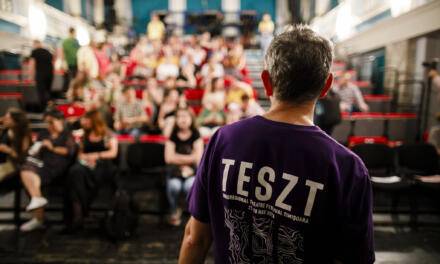Leading theatre directors in Europe are warning that the pandemic shutdowns are not only threatening the long-term viability of theatres—they are also seriously risking the development of the new generation of theatre artists.
Speaking on behalf of 44 major theatres around Europe, the board of the European Theatre Convention (ETC) has stressed that the theatre “production jam” effect—caused by postponing or cancelling an entire season of performances—will all but eradicate the time and space for young artists to perform, direct, and develop on Europe’s stages “for the next 3-5 years.”
The statement comes as theatres across Europe continue to cancel activities through April 2021 in anticipation of a lack of access to audiences. This would mark 14 months of cancellations since the start of the COVID-19 pandemic.
“This COVID-19 crisis has shone a spotlight on just how precarious our theatre structures are. Some theatres have been forced to close permanently, and many actors have been without income and are considering leaving the industry,” the board warns.
But there is one issue that nobody is talking about yet: the serious impact on young artists.
When theatres can re-open again, in a context of reduced audiences and stretched finances, they will have to re-stage an entire season of performances that had already been cancelled or postponed.
The ensuing “production jam,” which is likely to condition our production cycles for the next 3-5 years, will squeeze the time and space for work that is still in development. This means that there will be drastically less access for young creatives to stage new work, or to step up from their studies into creation. As a result, we risk creating a ‘lost generation’ of young artists, who are unable to develop and grow as normal.
As publicly funded theatres, we have a responsibility to nourish the next generation of artists and ensure a diverse cultural expression for local audiences and communities. We are now faced with new challenges and we need to pool our resources—and completely change the way we think about supporting emerging artists—to make the little that is left available for us all to create something bigger and richer for the years to come.
The statement follows ETC’s continued lobbying for theatres over the past year, including calls for increased EU and Member State support to compensate for the loss of theatre income; for strengthened support for theatres and international collaboration in the Creative Europe programme; and for ETC Member Theatres to share best practice on respecting all healthcare requirements and re-opening.
It also follows cross-European calls for theatres to be allowed to open safely, to provide the hope and imagination that we need to survive and “remain human.”
This article was originally published by the European Theatre Convention and has been reposted with permission. To read the original article, click here.
This post was written by the author in their personal capacity.The opinions expressed in this article are the author’s own and do not reflect the view of The Theatre Times, their staff or collaborators.
This post was written by European Theatre Convention.
The views expressed here belong to the author and do not necessarily reflect our views and opinions.


















